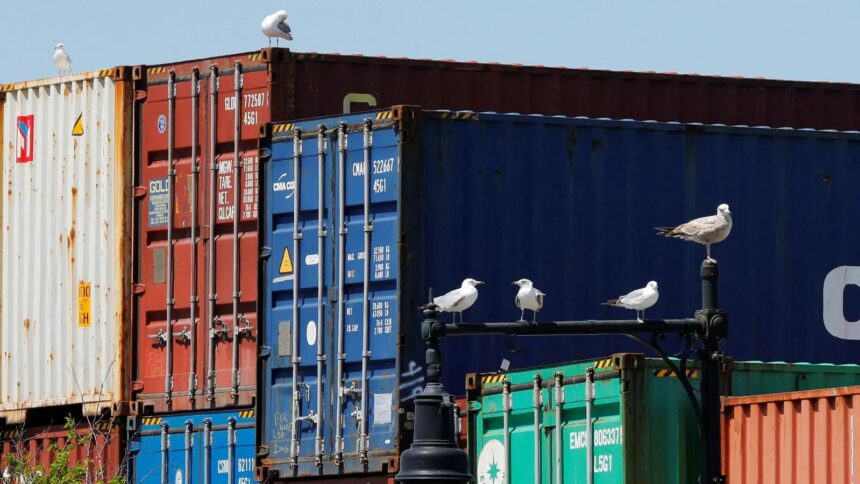Western labour and environmental standards continue to pose challenges for Indian trade negotiators, with the UK’s carbon tax — it is expected to disrupt India’s exports of iron, steel, aluminium, ceramics and cement — emerging as a key sticking point in talks aimed to finalise a trade deal during the latest round of negotiations in London, The Indian Express has learnt.
As the UK remains unwilling to grant any concession under its Carbon Border Adjustment Mechanism (CBAM), which seeks to impose duties on carbon-intensive imports, India has proposed a “rebalancing mechanism” which would require the UK to compensate Indian industry for losses incurred due to the regulation.
“The ‘rebalancing mechanism’ article has been inserted into the ‘general exceptions’ chapter of the negotiating text between the two countries. This would enable India to claim compensation for its losses and ensure the UK does not raise a dispute against India at the World Trade Organisation (WTO),” a government official, speaking on the condition of anonymity, told .
The general exceptions chapter in international trade agreements such as the General Agreement on Tariffs and Trade (GATT) allows countries to implement measures that might “otherwise violate trade rules”, provided they are justified on grounds such as public health or environmental protection, according to the WTO.
Among India’s earlier demands were concessions for Indian MSMEs and country-specific exemptions. The two sides also discussed harmonising carbon emission standards to allow Indian carbon taxes to remain within the country, but differences in measurement techniques remain unresolved.
The draft UK CBAM legislation states that the levy will apply to imported goods from January 1, 2027 and defines CBAM goods as aluminium, cement, fertilisers, hydrogen, iron and steel — sectors associated with high carbon emissions.
The draft also outlines how emissions will be calculated and how the CBAM rate will be set, based on a domestic sectoral price linked to the UK Emissions Trading Scheme.
India’s Carbon Credit Trading Scheme (CCTS) is based on intensity of emission that suits a developing nations model as against the system in Western countries that deals with absolute emission.
Ajay Srivastava, former trade officer and head of the Global Trade Research Initiative (GTRI), said: “The UK’s proposed CBAM poses a significant concern for Indian exports, as the regulation would result in the UK gradually imposing higher taxes on imports based on their carbon footprint, potentially far exceeding the UK’s current average tariff rate of under 2 per cent.”
“While the FTA might reduce or eliminate tariffs, Indian exports could still face hefty carbon taxes, unlike UK exports to India,” he said.
Srivastava said India must be vigilant on non-traditional trade topics such as labour, environment, gender and intellectual property rights when dealing with developed countries, as these often require domestic policy changes.
“Even if the UK agrees to eliminate tariffs on sectors like textiles, Indian exporters may still have to meet stringent UK sustainability requirements. This could harm Indian exports, particularly in labour-intensive sectors. India must negotiate firmly to ensure that market access gained through tariff elimination is not undermined by other barriers,” he said.
Finance Minister and Commerce and Industry Minister have called the CBAM, or carbon tax, an “unfair” measure and a violation of the “common but differentiated responsibilities” (CBDR) principle of multilateral climate negotiations.
This principle holds that while all countries must act on climate change, their responsibilities are not equal due to differing levels of economic development.
The carbon tax, first introduced by the European Union, has also met with strong resistance in India. Notably, the EU’s CBAM is set to take effect in January 2026, with a transition period — requiring exporters to report data to EU authorities — already underway since October 1, 2023. This is particularly significant for India, which sends over 15 per cent of its total goods exports to the EU. In 2022–23, India exported goods worth $75 billion to the bloc.
While several countries, including China, Russia, Brazil and South Africa, have taken the EU to the WTO over CBAM, India is yet to file a formal case as both sides are actively pursuing a free trade agreement. Similarly, India and the UK continue to negotiate, the talks aimed at finding a common ground.
A query emailed by The Indian Express to the Ministry of Commerce and Industry did not elicit a response until Monday evening.








